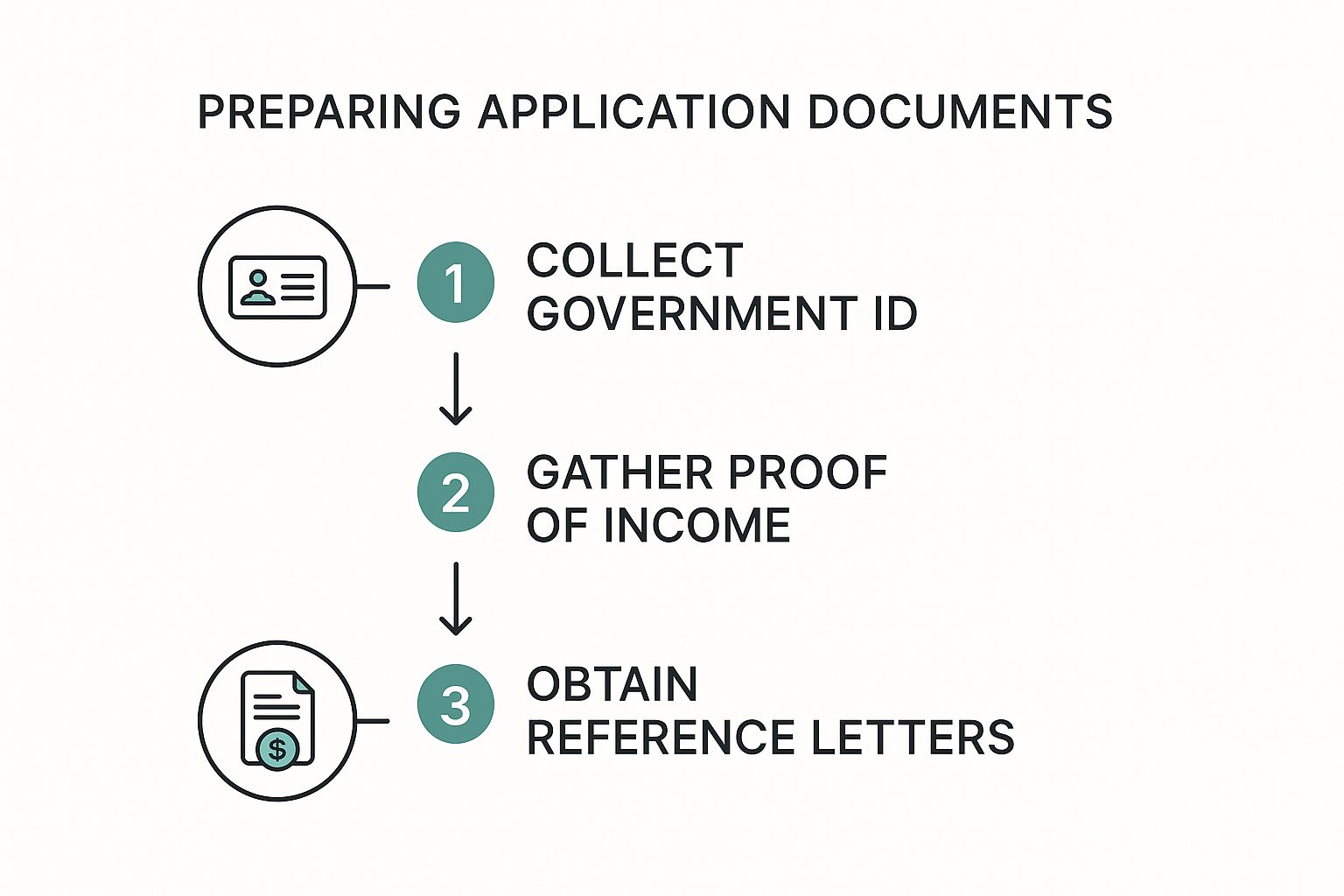Navigating the apartment application process can feel like a high-stakes job interview. It's your first, and often only, chance to make a great impression on a potential landlord. This isn't just about filling out forms; it's about strategically presenting yourself as the organized, reliable, and ideal tenant they're looking for. In a competitive market, a sharp application can be the one thing that puts you at the front of the line.
Why a Flawless Application is Your Secret Weapon

Let's be real: landlords and property managers have their pick of applicants for a great apartment. Your application is the very first tool they use to decide if you’re a good fit, long before they ever meet you in person. A sloppy, incomplete, or rushed form immediately sends the wrong message, hinting that you might be just as careless with rent payments or taking care of the property.
Put yourself in the property manager's shoes for a minute. They're trying to find a tenant who is:
- Financially Stable: Can you prove you can pay the rent on time, every single month?
- Responsible: Can they trust you to treat their property with respect?
- Low-Hassle: Are you someone who will follow the lease agreement without causing issues?
A well-organized application package answers a confident "yes" to all these questions, building trust from the get-go.
Standing Out When Competition is Fierce
Even as the market ebbs and flows, the competition for the best apartments stays pretty intense. In 2025, vacancy rates were sitting at a steady 8.2%, and with over 151,000 new units absorbed in a single quarter, you can bet that property managers are moving fast. They need to screen people efficiently and pick the best candidate quickly.
This means a polished application with all your income and credit details verified isn't just nice to have—it's essential.
Think of your application as a marketing brochure for you. A complete and professional submission is the single best way to beat out the competition and land the keys to your new place.
This is about more than just data entry; it’s about telling a convincing story about why you’re the right choice. It’s similar to how having a strong personal brand can open professional doors. In the same way, a standout application solidifies your credibility as a top-tier renter. If you're interested in building a solid digital footprint, you can learn more about the benefits of owning a personal domain.
Get Your Rental Application Toolkit Ready
The key to a smooth, stress-free apartment search? Have all your paperwork lined up before you even start looking. I always tell my clients to think of it as building an "apartment go-bag." When you can hand over a complete application package on the spot, you're sending a powerful message to the property manager: you're organized, serious, and ready to go.
Honestly, this single step can be the difference between landing your dream apartment and losing it to someone who was just a little more prepared. Most landlords operate on a first-come, first-served basis for qualified applicants, so being ready to pounce gives you a massive advantage.
What Goes in the Toolkit?
Your main goal is to create a master file—both digital and physical copies—of every document a landlord might ask for. This completely eliminates that last-minute panic of trying to find a scanner or call your boss for a document.

As you can see, it's a pretty straightforward process. You start with proving who you are and finish by showing you're a reliable tenant.
A Deeper Dive Into Your Finances
Let's be real: for landlords, it mostly comes down to the money. The industry standard is that they want to see your gross monthly income is at least three times the monthly rent. To back this up, you'll need more than just your word.
For a lot of people, the financial paperwork can feel like the biggest hurdle. Knowing how to easily get your bank statement and other documents ahead of time can make this part of the process a breeze.
Here’s a breakdown of everything you should have ready to go in your financial file.
Your Rental Application Document Checklist
This table covers the most common documents requested by property managers. Having these on hand will put you ahead of the game.
| Document | Purpose in the Application | Where to Get It |
|---|---|---|
| Government-Issued Photo ID | The most basic step—it proves you are who you say you are. | A clear photo or scan of your driver’s license, passport, or state ID. |
| Recent Pay Stubs | Shows your current, consistent income from employment. | Your company’s HR or payroll portal; ask your manager if you're unsure. |
| Bank Statements | Verifies your income, shows cash flow, and confirms you have funds for a deposit. | Download PDFs directly from your bank's online portal or app. |
| Offer Letter | Essential if you're relocating for a new job; it proves future income. | Your new employer's HR department should provide this. |
| Tax Returns | Gives a big-picture view of your annual income, especially for freelancers. | Download from the IRS website or your tax software (like TurboTax). |
| Reference Contacts | Vouch for your reliability as a tenant and person. | Contact info for previous landlords and a professional or personal reference. |
Having these documents gathered, scanned, and saved in a dedicated folder on your phone or Google Drive is a game-changer. Imagine being able to email your full application from your phone while you're still standing in the apartment you just fell in love with. That's how you show a landlord you mean business.
How to Fill Out the Application Form

Think of your rental application as the very first impression you make. It’s more than just a form; it's your opportunity to show the property manager that you're a responsible and reliable prospective tenant. An application that’s sloppy, incomplete, or confusing can quickly get moved to the bottom of the stack, so it pays to be thorough.
These days, most of the process is handled online, which makes things much easier. Here at Cynthia Gardens, you can start the rental application right on our website to see exactly what information you’ll need to provide. My best advice? Take your time. A simple typo in an email address or phone number can create frustrating delays for everyone involved.
Addressing the Tricky Parts
Life isn't always a straight line, and your application history might reflect that. That’s completely fine. The trick is to be upfront and honest about any potential speed bumps a landlord might see.
- Employment Gaps: If you have a recent gap in employment, don't leave it to their imagination. A short, professional note explaining the situation—like "Traveled for three months between roles" or "Took a semester off for family reasons"—goes a long way.
- Non-Traditional Income: Are you a freelancer, gig worker, or contractor? Your income might not look like a traditional W-2. The best way to handle this is to use tax returns and bank statements to demonstrate a consistent average income over the last year or two.
- Pet Information: Don't try to hide your pets. Be completely honest about their breed, weight, and age. Adding a quick note that your pet is well-behaved and house-trained is a nice touch that can definitely help your case.
It’s also worth noting that the rental market is always evolving. With over 40% of renters now saying pet-friendly policies are a top priority and a 20% increase in demand for sustainable living features, applications are starting to change, too. Don’t be surprised if you see questions designed to see if you’re a good fit for the community’s overall culture.
Your application tells a story. The goal is to present a clear, honest narrative that shows you are a responsible and reliable tenant who will treat the property with care. Your transparency builds immediate trust.
Navigating Credit and Background Checks
For most people, this is the most nerve-wracking part of the whole process. The moment you give a landlord permission to run your credit and background check, it can feel like your entire life is under a microscope. But it helps to remember what they're actually looking for.
Landlords and property managers aren't digging for dirt or expecting a perfect record. Their main goal is simple: managing risk. They need to feel confident that you'll pay your rent on time and be a responsible resident. Your credit report tells them about your financial habits, and the background check looks for serious issues that could impact the safety and peace of the community.
What They Actually See on Your Report
When a landlord pulls your credit, they're not just glancing at that three-digit number. They're reading the story behind it. They zoom in on a few key areas to get a picture of your financial reliability.
- Payment History: This is the big one. A consistent history of paying your bills on time is the best indicator that you’ll also pay your rent on time.
- Debt-to-Income Ratio: They do some quick math to see if you can realistically afford the rent on top of your existing monthly debt payments (like car loans or credit card bills).
- Derogatory Marks: Major red flags like accounts in collections, recent bankruptcies, or—most importantly—past evictions will definitely get their attention and require an explanation.
Remember, they're seeing a high-level summary of your financial life, not a line-by-line breakdown of your coffee budget. The focus is purely on your ability to handle your financial commitments.
What to Do if Your Record Isn't Perfect
So, what happens if your credit is less than stellar? First, don't assume it’s an automatic deal-breaker. The key is to get out ahead of the problem instead of hoping they won't notice. Transparency is your best friend here.
Don't let a landlord discover a problem on their own. It’s far better to address it yourself, either in a brief, honest cover letter or a direct conversation. Explaining that a low score stems from a past job loss or a medical emergency shows that you're accountable.
You can also offer a solution to make them feel more comfortable. Proposing a larger security deposit (if you have the funds) or bringing on a co-signer with a strong credit profile can often seal the deal. Taking these steps shows you understand their concerns and are serious about being a great tenant, which can make all the difference.
Navigating Fees, Timelines, and Follow-Up

So you've hit "submit" on your application. Now what? This part of the process is more than just a waiting game; it’s about staying on top of the final pieces, from paying the right fees to knowing when and how to follow up.
First things first, let’s talk about the money involved. You'll almost always have an application fee, which usually runs between $35 to $75. This is a non-refundable charge that pays for the property manager to run your background and credit checks. Occasionally, you might also be asked for a holding deposit to take the apartment off the market while they review your file.
What to Expect on the Timeline
In most cases, you should hear something back within 24 to 72 hours. But don't be surprised if it takes a bit longer. The most common holdup? Your references. If the property manager can't get ahold of your current employer or previous landlords, the whole process stalls.
Being organized here is key. Think of it like a mini-project where you're the manager—applying solid strategies for meeting project deadlines can make all the difference in keeping your application moving forward.
Pro Tip: If three business days go by with no word, it's perfectly acceptable to send a quick, polite follow-up email. Just briefly restate your interest in the apartment and ask if they have an update on your application. It shows you’re serious, not impatient.
It's also worth remembering that the rental market itself influences everything. With new apartment construction slowing down— 65% of developers are reportedly pulling back—the market is getting tighter. That means more competition for good apartments and potentially stricter screening from landlords.
Whether you get a "yes" or a "no," use it as a learning moment. An approval is your cue to dive into the lease agreement, while a denial is an opportunity to politely ask for feedback so you can strengthen your next application.
Answering Your Top Application Questions
Let's be honest, filling out a rental application can be a bit nerve-wracking. Even if you've done it a dozen times, common questions and tricky situations always seem to pop up. What if my credit score isn't perfect? What if I've never rented before?
Knowing how to handle these common hurdles before you apply can make all the difference.
The Big Question: What About My Credit Score?
This is probably the number one concern for most applicants. While there's no single "magic number," most property managers are looking for a credit score of 620 or higher to feel comfortable.
If your score falls a little short, don't panic. It’s not necessarily a dealbreaker. The key is to be upfront about it. You can strengthen your application by offering a larger security deposit or including a short, honest letter explaining any past issues, like resolved medical bills or a temporary job loss.
What If I’m a First-Time Renter?
Having no rental history is another classic chicken-and-egg problem, but landlords see it all the time. You just need to build a compelling case in other ways.
Focus on demonstrating stability and responsibility. This means providing:
- Rock-solid proof of income (pay stubs, offer letter)
- Strong personal references from a manager, professor, or mentor
- Proof of savings showing you can comfortably cover the deposit and first few months' rent
For a broader look at the entire rental journey, you might find this complete guide to renting an apartment in the Netherlands offers some useful international perspectives.
What happens if you get denied? Legally, you have the right to know why, especially if the decision was based on your credit report. Don’t be afraid to politely ask for feedback. It’s invaluable information that can help you strengthen your next application.
At the end of the day, transparency and preparation are your best allies. Most application hiccups can be smoothed over with clear communication and having all your documents ready to go. To make sure you're on the right track, take a look at our guide on the five common mistakes to avoid when renting an apartment.
Ready to find your perfect home in Boca Raton? Cynthia Gardens offers serene, spacious one-bedroom apartments in a prime location. Apply online today!
